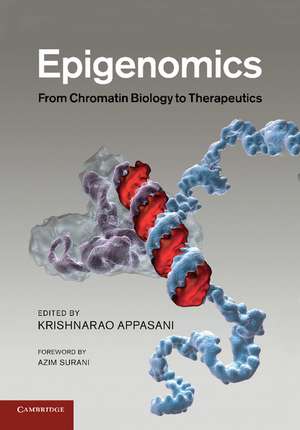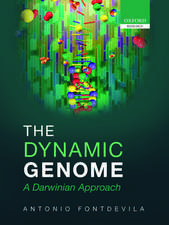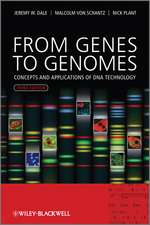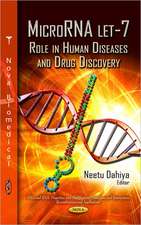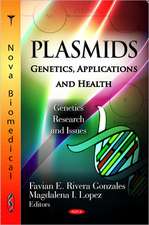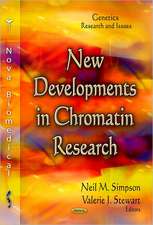Epigenomics: From Chromatin Biology to Therapeutics
Editat de Krishnarao Appasani Cuvânt înainte de Azim Suranien Limba Engleză Paperback – 9 iul 2014
| Toate formatele și edițiile | Preț | Express |
|---|---|---|
| Paperback (1) | 485.28 lei 6-8 săpt. | |
| Cambridge University Press – 9 iul 2014 | 485.28 lei 6-8 săpt. | |
| Hardback (1) | 1021.77 lei 6-8 săpt. | |
| Cambridge University Press – aug 2012 | 1021.77 lei 6-8 săpt. |
Preț: 485.28 lei
Preț vechi: 545.25 lei
-11% Nou
Puncte Express: 728
Preț estimativ în valută:
92.86€ • 97.15$ • 77.14£
92.86€ • 97.15$ • 77.14£
Carte tipărită la comandă
Livrare economică 02-16 aprilie
Preluare comenzi: 021 569.72.76
Specificații
ISBN-13: 9781107697836
ISBN-10: 1107697832
Pagini: 574
Ilustrații: 100 b/w illus. 24 colour illus. 24 tables
Dimensiuni: 170 x 244 x 29 mm
Greutate: 0.9 kg
Ediția:New.
Editura: Cambridge University Press
Colecția Cambridge University Press
Locul publicării:New York, United States
ISBN-10: 1107697832
Pagini: 574
Ilustrații: 100 b/w illus. 24 colour illus. 24 tables
Dimensiuni: 170 x 244 x 29 mm
Greutate: 0.9 kg
Ediția:New.
Editura: Cambridge University Press
Colecția Cambridge University Press
Locul publicării:New York, United States
Cuprins
List of contributors; Foreword; Preface; Part I. Basics of Chromatin Biology and Biochemistry: 1. Introduction to epigenomics; 2. Epigenetics and its historical perspectives; 3. Functional networks of human epigenetic factors; 4. Nucleosome positioning in promoters: significance and open questions; 5. Chemical reporters of protein methylation and acetylation; 6. Long non-coding RNA in epigenetic gene silencing; Part II. Epigenomic Imprinting and Stem Cells: 7. Active DNA demethylation - the enigma starts in the zygote; 8. Histone modifications of lineage specific genes in human embryonic stem cells during in vitro differentiation; 9. Epigenetic stability of human pluripotent stem cells; 10. Impact of CpG methylation in addressing adipose derived stem cell differentiation towards the cardiac phenotype; 11. Regulation of stem cell epigenome by REST; 12. MicroRNAs in embryonic stem cells; 13. Regulation of timing of replication; Part III. Epigenomic Assays and Sequencing Technology: 14. Detection of CpG methylation patterns by affinity capture methods; 15. Genome-wide ChIP-DSL profiling of promoter methylation patterns associated with cancer and stem cell differentiation; 16. Quantitative, high-resolution CpG methylation assays on the pyrosequencing platform; 17. DNA methylation profiling using Illumina BeadArray platform; 18. Advances in capillary electrophoresis-based methods for DNA methylation analysis; 19. Genome-wide methylome analysis based on new HT sequencing technology; 20. 3-D quantitative DNA methylation imaging for chromatin texture analysis in pharmacoepigenomics and toxicoepigenomics; Part IV. Epigenomics in Disease Biology: 21. Cancer classification by genome-wide and quantitative DNA methylation analyses; 22. Promoter CpG island methylation in colorectal cancer: biology and clinical applications; 23. The epigenetic profile of bladder cancer; 24. Genome-scale DNA methylation analyses of cancer in children; 25. The epigenetics of facioscapulohumeral muscular dystrophy; 26. Modulating histone acetylation with inhibitors and activators; Part V. Epigenomics in Neurodegenerative Diseases: 27. Study design considerations in epigenetic studies of neuropsychiatric disease; 28. Epigenetic regulation in human neurodevelopmental disorders including autism, Rett syndrome and epilepsy; 29. The neurobiology of chromatin-associated mechanisms in the context of psychosis and mood spectrum disorders; 30. Genome-wide DNA methylation analysis in patients with familial ATR-X mental retardation syndrome; 31. Kinases and phosphatases in the epigenetic regulation of cognitive functions; Part VI. Epigenetic Variation, Polymorphism and Epidemiological Perspectives: 32. Epigenetic effects of childhood abuse on the human brain; 33. X-linked expressed SNPs and dosage compensation; 34. Epigenomic diversity of colorectal cancer; 35. Epigenetic epidemiology: transgenerational responses to the environment; Index.
Recenzii
'This is an excellent work, highly readable and well documented by more than a hundred scientists from academia and industry. The extensive coverage of current theory, new technologies, and disease mechanisms, all associated with epigenomics, make this book invaluable to students and researchers in a wide range of disciplines. Recommended for all academic libraries.' Atsuo Ogura, RIKEN BioResource Center, Japan
'Congratulations on a great book! It is a very impressive collection of high-quality contributions in several relevant areas of epigenetics. I enjoyed reading it and I am sure that it will be a very useful resource for everyone in the epigenetics field. I will definitely recommend it to my colleagues!' Karl Ekwall, Karolinska Institute, Sweden
'… Appasani gathers our present knowledge about epigenomics in this interesting book. The topics covered will allow the reader to understand the role of epigenetic mechanisms in cell biology and disease. At the same time, this book offers a good opportunity to learn about the epigenomic techniques applied in both basic research and in biotechnology and biomedical companies.' Marian Martinez-Balbas, CSIC-Barcelona Molecular Biology Institute
'… provides a broad coverage of the key aspects of epigenetics and its future potential to treat epigenetic related diseases. I recommend this book as an excellent up-to-date reference for established investigators in the field of epigenomics and to newcomers who want an update of the recent developments in this field. The book can also serve as a reference text for students as part of an advanced course on molecular biology.' Richard L. Momparler, University of Montréal
'This book is an excellent update on the current status of epigenomics, a relatively new discipline of life sciences bridging genetics and epigenetics … The book covers the different aspects from basic science to available technology and highlights the significant impact of epigenomics on the understanding of human disease. Epigenetic abnormalities are very critical in the pathogenesis of human cancer; the understanding of epigenetics is of importance for the development of innovative therapeutics including the potential pharmaceutical use of (pluripotent) stem cells. Experts in their field provide up-to-date information making the book very valuable …' Christine Guenther, Apceth GmbH and Co. KG, Munich
'Congratulations on a great book! It is a very impressive collection of high-quality contributions in several relevant areas of epigenetics. I enjoyed reading it and I am sure that it will be a very useful resource for everyone in the epigenetics field. I will definitely recommend it to my colleagues!' Karl Ekwall, Karolinska Institute, Sweden
'… Appasani gathers our present knowledge about epigenomics in this interesting book. The topics covered will allow the reader to understand the role of epigenetic mechanisms in cell biology and disease. At the same time, this book offers a good opportunity to learn about the epigenomic techniques applied in both basic research and in biotechnology and biomedical companies.' Marian Martinez-Balbas, CSIC-Barcelona Molecular Biology Institute
'… provides a broad coverage of the key aspects of epigenetics and its future potential to treat epigenetic related diseases. I recommend this book as an excellent up-to-date reference for established investigators in the field of epigenomics and to newcomers who want an update of the recent developments in this field. The book can also serve as a reference text for students as part of an advanced course on molecular biology.' Richard L. Momparler, University of Montréal
'This book is an excellent update on the current status of epigenomics, a relatively new discipline of life sciences bridging genetics and epigenetics … The book covers the different aspects from basic science to available technology and highlights the significant impact of epigenomics on the understanding of human disease. Epigenetic abnormalities are very critical in the pathogenesis of human cancer; the understanding of epigenetics is of importance for the development of innovative therapeutics including the potential pharmaceutical use of (pluripotent) stem cells. Experts in their field provide up-to-date information making the book very valuable …' Christine Guenther, Apceth GmbH and Co. KG, Munich
Descriere
Experts from academia and both the biotechnology and pharmaceutical industries introduce biological, medical and methodological aspects of the emerging field of epigenomics.
